Coca-Cola: Simple choices following sugar tax
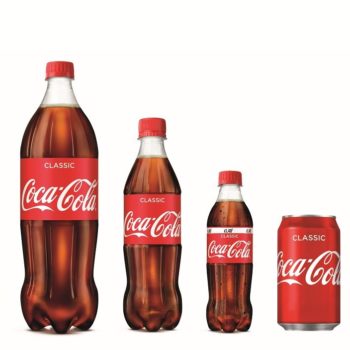
In a ShelfLife exclusive, Coca-Cola outlines how a new pack line-up will give consumers simple choices when the government’s tax on sugar-sweetened drinks is introduced. While the tax will lead to an increase in the price of Coca-Cola Classic, the price of Diet Coke and Coca-Cola Zero Sugar will not be affected. Here, Coca-Cola HBC explains these changes and outlines how the company’s reformulation programme responds to the changing needs of consumers…
14 February 2018
The government’s tax on sugar-sweetened soft drinks will come into effect from 1 April 2018 and as a direct result of this tax, the price per litre of Coca-Cola Classic will increase from that date. The no sugar options in the Coca-Cola range; Coca-Cola Zero Sugar and Diet Coke are not affected by the sugar-sweetened drinks tax. In fact, Coca-Cola’s extensive reformulation of its drinks over the past two years means that the majority of the company’s portfolio is exempt from the imminent government tax on sugarsweetened drinks.
It also means that Coca-Cola HBC is now the market leader in sales of zero sugar drinks on the island of Ireland. Ahead of the introduction of this new sugar tax, the company has decided to introduce a new pack line-up to ensure that consumers continue to have clear and simple choices when it comes to choosing the drinks they want to buy.
New pack line-up
From this month onwards, shoppers will start to see some changes to the pack line-up across the Coca-Cola range in advance of the implementation of the sugar sweetened soft drinks tax. The new line-up offers greater choice to consumers and customers, thanks to an increased range of reduced sugar drinks, and the introduction of new smaller, more convenient pack sizes for Coca-Cola Classic. The changes are also in keeping with the company’s marketing strategy to ‘Hero Zero’, which encourages shoppers to ‘Choose no sugar’ options. Impulse consumption: The full Coca-Cola range will continue to be available in 500ml bottles, Coca-Cola’s most popular pack with consumers. The 330ml can will also remain available in the full range. From April 2018, Coca-Cola Classic consumers will also be able to choose a new smaller, more convenient pack size with the introduction of a sleek new 250ml slimline can and a 375ml (PET) bottle.
Take-home
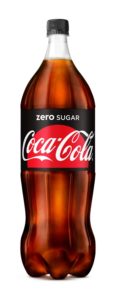 To increase value and availability of zero sugar options in ‘take home’ offerings, Diet Coke and Coca-Cola Zero will increase to a 2 litre pack and Coca-Cola Classic will be available in a 1.5 litre pack size. These packs will replace the existing 1.75 litre packs. The full Coca-Cola range will continue to be available in 1.25 litre bottles. In line with the changes to the single bottles, twin packs will change. Twin packs of Coca-Cola Classic will be available in 2 x 1.5 litre bottles, alongside twin packs of the zero sugar colas in 2 x 2 litre bottles. The range of multipack cans will also undergo changes.
To increase value and availability of zero sugar options in ‘take home’ offerings, Diet Coke and Coca-Cola Zero will increase to a 2 litre pack and Coca-Cola Classic will be available in a 1.5 litre pack size. These packs will replace the existing 1.75 litre packs. The full Coca-Cola range will continue to be available in 1.25 litre bottles. In line with the changes to the single bottles, twin packs will change. Twin packs of Coca-Cola Classic will be available in 2 x 1.5 litre bottles, alongside twin packs of the zero sugar colas in 2 x 2 litre bottles. The range of multipack cans will also undergo changes.
Coca-Cola Classic multipacks will be available in 4 pack, 6 pack, 10 pack and 20 pack cans. Zeros and Diets will be available in 4 pack, 8 pack, 12 pack and 24 pack cans. The new recommended sale prices (RSPs) will reflect the spirit of the government’s sugar-sweetened drinks tax, with the tax applied in line with the defined rates for drinks with greater than 5g sugar per 100ml, and drinks with more than 8g of sugar per 100ml. However, as always, the on-shelf price of products is at the discretion of the company’s retail and wholesale partners.
Matthieu Seguin, general manager, Coca-Cola HBC Ireland and Northern Ireland, appears confident this is the right strategy to adopt.
“Our approach will meet the needs of our consumers,” he says, “keeping their choices clear and simple, and giving them what they want.” Seguin also emphasises that Coca-Cola’s approach to reformulation and new product development has been driven by the knowledge that consumers want to manage their sugar intake. “We have consistently diversified our portfolio and reduced the sugar across our range,” Seguin says. “The majority of the drinks we sell are now lower in sugar – except for the much-loved Coca-Cola Classic and some of our energy drinks and mixers, which remain unchanged.
“In line with our ongoing ‘Hero Zero’ marketing strategy,” he adds, “we will also offer greater value and choice across our ‘zero sugar’ options, which are exempt from the soft drinks levy.”
Lights-leadership
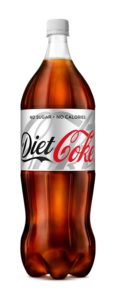 Across the island of Ireland, Coca-Cola HBC sells more low and no-sugar beverages than any other company. It also has the fastest growing non-sugar soft drinks portfolio in the market, driven by Coca-Cola Zero and Fanta Zero.*
Across the island of Ireland, Coca-Cola HBC sells more low and no-sugar beverages than any other company. It also has the fastest growing non-sugar soft drinks portfolio in the market, driven by Coca-Cola Zero and Fanta Zero.*
This has been achieved through extensive reformulation of its portfolio to reduce sugar while retaining the same great taste. The company is also delivering against its commitment to increase availability and demand for its ‘zero’ sugar options.
Since 2010, Coca-Cola has reduced sugar across its portfolio on the island of Ireland by approximately 13% and currently more than 60% of the sales volume of its products contain less than 5g sugar per 100ml. This work is part of ongoing efforts across the globe to respond to consumer needs and will also help to reduce the impact of the new government tax on sugar-sweetened drinks on retailers and consumers alike. This tax will be implemented on 1 April in the Republic of Ireland and 6 April in Northern Ireland.
Coca-Cola Classic – a firm favourite
While extensive recipe changes have been underway across the Coca-Cola portfolio to reduce sugar across its sparkling flavours, adult mixers, still and energy drinks, the recipe for Coca-Cola Classic will remain unchanged. As one of the few drinks within the portfolio that will be subject to the soft drinks levy, Coca-Cola Classic is an iconic drink that has been enjoyed by people for more than 130 years and will keep the taste that people love.
As the number one brand across the globe, it has also remained on of the most popular brands here in Ireland. It was named 8th in the Kantar Worldpanel 100 Masterbrands last summer. Coca-Cola delivers more than €100m in value to the grocery channel annually. “People love the taste of Coca-Cola Classic and have told us not to change it,” says Seguin. “However, our research did reveal that our consumers wanted greater options to help manage their sugar intake, and these smaller, more convenience pack sizes in Coca-Cola Classic will allow them to do just that.”
Coca-Cola’s commitment to consumers on reformulation
The changes that will be made across Coca-Cola’s pack line-up come in addition to the extensive reformulation efforts across the whole portfolio to reduce sugar while innovating to introduce great tasting zero sugar options. Following initial reformulation of Fanta Orange in 2017, it will undergo further sugar reduction ahead of April 2018 to bring the sugar content below 5g per 100ml.
Furthermore Sprite, which is already a mid-calorie drink, will move to zero sugar in Q1 2018. Thanks to these efforts, both Fanta Orange and Sprite will be exempt from the soft drinks levy.
As the core Schweppes range continues to deliver growth in the category, all key variants will be reformulated to reduce sugar to less than 5g per 100ml. The new lower sugar recipes for Tonic, Bitter Lemon, Elderflower, and Ginger Ale will ensure that they remain tax exempt, and affordable, across 1 litre (PET) bottles, 150ml cans and the new 4 x 200ml glass packs.Other changes include a move to fully zero sugar recipes for Coca-Cola Zero Cherry, and the Oasis range is now low in sugar in calories. In 2018, all flavour extensions for Coca-Cola, Fanta and Sprite will be zero sugar variants, continuing the drive to encourage more consumers to try our zero sugar variants, while having a great tasting range of drinks to choose from.
The business’s energy portfolio has also changed to ensure continued growth in the expanding zero segment. Coca-Cola HBC is the leader in lights for the energy category, with Monster Ultra driving the growth of the ‘zero sugar energy’ category overall. This will continue into 2018 with an extension of the zero offerings across the Monster range. This focus on reformulation and growth of ‘zero’ offerings has contributed to an overall 5% sugar reduction across the company’s portfolio in the last year alone across the island of Ireland.



 Print
Print

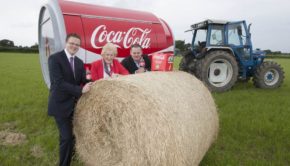
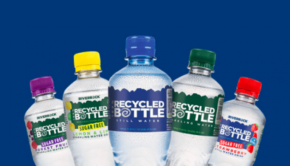


Fans 0
Followers